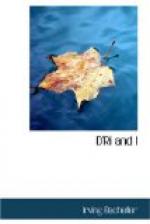Evidently I was nearing a village. Groups of men were in the shady thoroughfare; children thronged the dooryards. There was every sign of a holiday. As we neared them I caught my sabre under my knee, and drew my hands into the long sleeves and waved them wildly, whooping like an Indian. They ran back to the fences with a start of fear. As I passed them they cheered loudly, waving their hats and roaring with laughter. An old horse, standing before an inn, broke his halter and crashed over a fence. A scared dog ran for his life in front of me, yelping as he leaped over a stone wall. Geese and turkeys flew in the air as I neared them. The people had seemed to take me for some village youth on a masquerade. We flashed into the open country before the sound of cheering had died away. On we went over a long strip of hard soil, between fields, and off in the shade of a thick forest. My horse began to tire. I tried to calm him by gentle words, but I could give him no confidence in me. He kept on, laboring hard and breathing heavily, as if I were a ton’s weight. We came to another clearing and fields of corn. A little out of the woods, and near the road, was a log house white-washed from earth to eaves. By the gate my horse went down. I tumbled heavily in the road, and turning, caught him by the bits. The big hat had shot off my head; the straw had fallen away. A woman came running out of the open door. She had bare feet, a plump and cheery face.
“Tonnerre!” said she. “Qu’est ce que cela?”
“My countrywoman,” said I, in French, feeling in my under-trousers for a bit of silver, and tossing it to her, “I am hungry.”
“And I have no food to sell,” said she, tossing it back. “You should know I am of France and not of England. Come, you shall have enough, and for no price but the eating. You have a tired horse. Take him to the stable, and I will make you a meal.”




